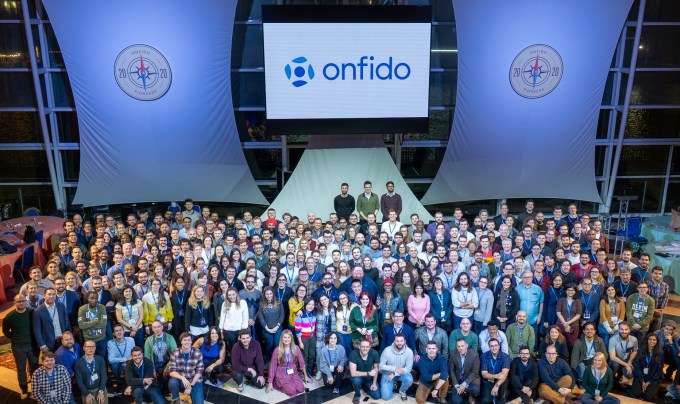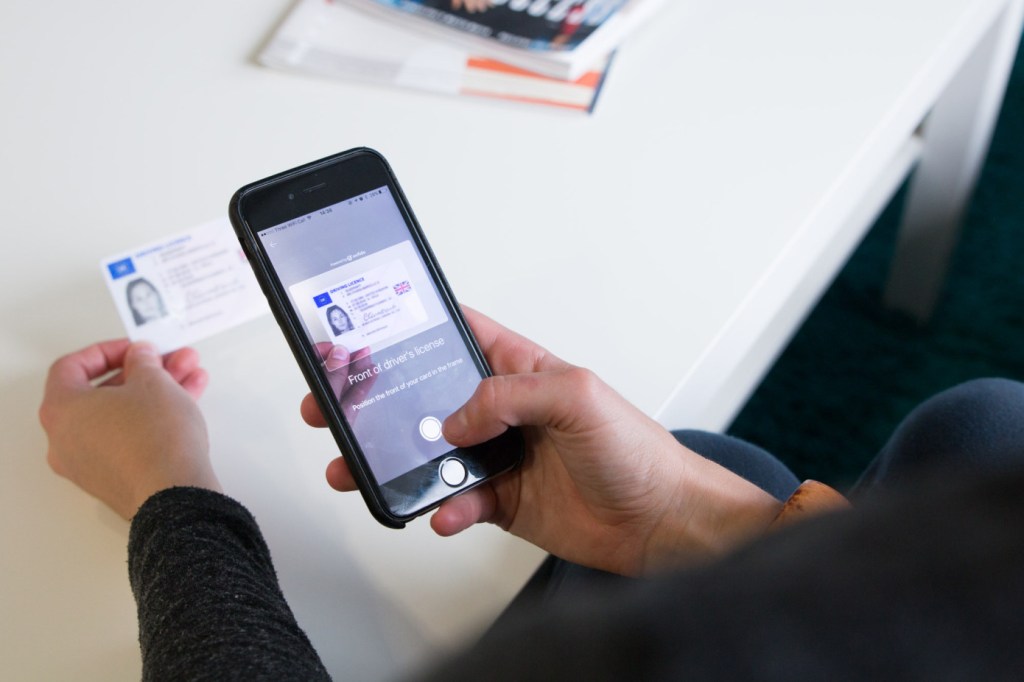Contactless transactions have become a major priority at a time when people all around the world are minimising their contact with others outside their households to slow down the often-insidious spread of the novel coronavirus. But if a lot of the consumer focus lately has been on things like payments or deliveries, that’s overlooking the fact that the “contactless” paradigm has been a big trend for years already.
Today, a London-based startup building tools to enable virtual identity verification — that is, a way of verifying you without requiring in-person, face-to-face interactions — is announcing a big round of funding.
Onfido, which uses AI to “read” a person’s identity documents and then uses facial recognition and other datapoints to verify that a person is who she or he says they are online — customers for its tech include major banks, government bodies, and businesses doing recruitment: any organization running parts of its processes virtually — is today announcing that it has raised $100 million.
It plans to use the money in a few ways. First, to expand its existing business, which has been growing especially strong in the US. Second, to fill out its ambition of building an alternative “identity verification” layer of the internet to replace credit bureaus, Facebook logins and other established channels. And third, to work on a new set of use cases that are now being talked about even more because of the pandemic, ranging from virtual voting and passport/visa applications through to secure ways of carrying out contact tracing to track the spread of a virus without compromising user privacy.
Ultimately, across all three, the aim is to solve what it sees as a long-standing problem on the internet and digital platforms overall: verifying people are who they say they are, and doing so in a way that doesn’t compromise a user’s privacy and security.
“Identity is broken and needs fixing,” Husayn Kassai, the CEO and co-founder, said in an internet. “That’s been a large part of our focus, and as time goes on, our processes in digitisation, privacy and security have been proven out in parallel with how the world is shifting.”
The round is being led by TPG Growth, the deep-pocketed firm that has backed the likes of Airbnb and Uber (which both run the kinds of businesses that need the kind of identity verification services that Onfido builds) over the years with billions of dollars of investment.
Onfido is not disclosing its valuation with this round but Kassai confirmed that it is definitely an upround. Onfido has now raised $200 million in total, with its last round — $50 million almost exactly a year ago — including Microsoft, Salesforce and SBI (once a SoftBank affiliate, now apparently separate) among the investors.
Kassai said that he started raising this round in January, just as the novel coronavirus was kicking off in China and eventually everywhere else around the world. The final stages of this deal were all done virtually. Between then and now, he said that business — already growing at a healthy clip — has picked up a new, urgent set of verticals that need to consider faster and safer ways to identify and verify users.
Onfido’s business up to now had largely been focused on helping rapidly scaling businesses like transportation-on-demand companies to help add on more drivers to their books while making sure they pass all their safety and other checks. More recently, organizations in healthcare, remittance and payments and non-profits verifying people who want to volunteer in relief efforts have emerged as key customers. These have respectively spiked 4x, 1.3x and 6x in recent weeks. The idea is that organizations using Onfido can speed up the time it takes to identify people to get them enrolled into healthcare services, or sending money, or helping those in need.
“About 750,000 people have volunteered to help the NHS in the UK,” he said, referring to the effort that the UK government set up to get more people to deliver medications and food, and help out hospitals in non-clinical capacities. “That’s great, but why wait for weeks to be verified? If you can sign up for a bank in moments why do you have to wait a week [or more] to help in a health crisis?”

While Onfido continues to build out this aspect of its business — R&D based in London, with a lot of the business team in California — Kassai said it is also working on trials of new kinds of identity and verification services that are still in development.
In essence, these are concepts for verifying without physical presence that have been considered for a while now for other reasons — be they more convenience for users, or cost-cutting, or to keep better digital track records of a process — that have taken on a new sense of urgency during the current pandemic.
Specifically, there are trials underway for working on secure, virtual voting; helping to verify people for passport and visa applications remotely; and ways of doing contact tracing of users for those trying to track and contain outbreaks of the novel coronavirus, or whatever virus comes next on the horizon.
The idea with these, Kassai said, is that there needs to be a way of identifying users without requiring them to share personal or other sensitive details every time, and that’s where the company’s ambition in building an “identity layer” comes in: if a company like Onfido can verify a user once, and then discard the information, it can then simply have a record of the person and not require documents or other personal information each time.
This is the theory, at least. There will be a number of regulated industries that will still have to hold on to personal information. But at a time when security breaches have chipped away at our various personal details and led to a vast wave on online crime — identity fraud is the most commonly committed crime in the US, Onfido points out, and one of the fastest growing in the world, with $2 trillion of related money laundering resulting from that — this could be a compelling idea to consider.
“Onfido’s use of AI to develop market leading tech is extraordinary,” said Mike Zappert Partner of TPG Growth, in a statement. “There is enormous demand for secure and simple identity verification and authentication across major sectors and we see Onfido becoming the new standard for digital access. Their team has done a remarkable job in a relatively short period of time, and we look forward to partnering with them to continue their momentum into new use cases and geographies.”































Comment